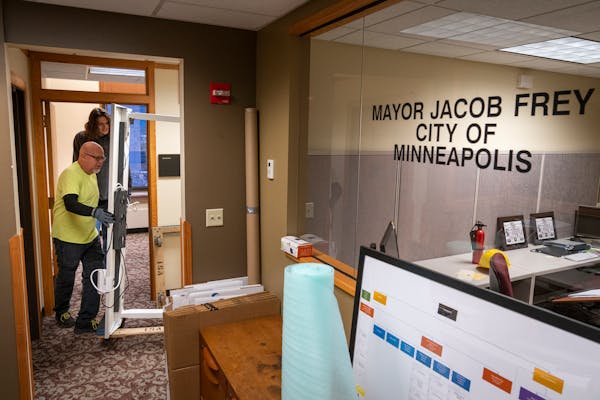The balance of power at Minneapolis City Hall could shift again under a pair of proposed changes to the city charter that could go to the City Council in 2024.
Two years after voters approved a "strong mayor" form of government that paved the way for Mayor Jacob Frey to grow his cabinet and consolidate decision-making, the city attorney's office is recommending further amendments to Minneapolis' constitution.
The proposal is still in its infancy, and is unlikely to quickly win the support of all council members. But if it is eventually approved by the City Council — or by voters, if it goes to the ballot — it would remove council members' power to weigh in on high-profile city hiring decisions and on how ethics violations are enforced.
Why does this matter?
Under the Frey administration, the mayor's office has become the most powerful in Minneapolis' history while the City Council has been stripped of control over day-to-day operations. Some council members have lamented the changes, saying they've made it harder to help with problems ranging from homeless encampments to missed trash pickups.
Council members who have lost a great deal of authority are in no rush to lose more.
"To what extent will we continue to chip away at and minimize the role of City Council and what is the purpose?" asked Council Member Elliott Payne.
Staff appointments
Currently, the mayor nominates about 20 department heads and the City Council confirms them at an open meeting, giving members of the public the chance to weigh in.
Under the proposed rules, this shared nomination process would continue to apply to the city's top five staffers — the community safety commissioner, city operations officer, city attorney, police chief and fire chief. They would in turn appoint all other department heads.
The new staff appointment process would conform to the mayor's newly created executive cabinet, said city spokeswoman Sarah McKenzie.
Frey said the process would also help the city hire and retain talent who otherwise might be scared off at the prospect of a confirmation hearing where they'd have to defend their professional work and risk being harshly interrogated in public.
In November, former interim City Operations Officer Heather Johnston withdrew her name from consideration for the permanent job after blasting the confirmation process as being politically charged.
"We're looking to professionalize operations, making Minneapolis a place where top talent wants to work," the mayor said. "Concern about the reputation damage during that council hearing has been one of the reasons why candidates don't apply and or choose to leave."
Two recent council confirmations — Enrique Velázquez as regulatory services director and Erik Hansen as the director of community planning and economic development — were cordial and ultimately unanimous. The sternest criticism came from members of the public dissatisfied with the city's response to homeless encampments.
"None of us are above critique, none of us are above improvement," said Council Member Jeremiah Ellison, acknowledging the role that members of the public play at staff confirmation hearings.
In St. Paul, the mayor and council together appoint heads of departments as well as the mayor's staff.
Ethics Commission
The other big change proposed for the city charter would enlarge and empower the Ethical Practices Board, a three-person body that reviews ethics complaints against elected officials and city staff.
The city attorney's office has proposed expanding the board into a five-member independent Ethics Commission and vesting it with "any power necessary and proper" for enforcing substantiated violations.
Currently, the council decides what discipline is appropriate for officials — including their own colleagues and allies — found to have broken the code of ethics.
"By placing all of the authority in the Commission, including enforcement authority, it creates a fully independent body, and prevents a situation where council members would have to sit in judgment of each other," said McKenzie.
In recent years, the Ethical Practices Board found that former council members Alondra Cano and Phillipe Cunningham violated the ethics code. The decisions came after Cano tweeted the personal contact information of people complaining about her attendance at a Black Lives Matter protest and Cunningham deleted a widely disliked Facebook post in which he disparaged a small business. But neither was ultimately disciplined; Cunningham lost his re-election bid and council members concluded Cano had violated ethical "aspirations" but not "substantive rules."
Council Member Linea Palmisano said an independent Ethics Commission whose members would make findings and dispense discipline could de-politicize the handling of ethics complaints.
"I think that it feels a bit false from the public end, if we have this body and we say we have this board but we never give it any teeth," she said.
If approved the new Ethics Commission would also oversee the Park Board, which has its own ethics code and investigates complaints internally.
Park Board Commissioner Cathy Abene said she isn't convinced that creating another independent city commission to process Park Board ethics reviews would make the process more transparent or meaningful.
"I want to be sure that we're not creating more government where it's not actually going to do do any good," she said. "Any of my constituents can email me directly and complain ... and then they can vote for me or get their friends to not vote for me. I think that kind of works."
The City Council could approve the proposed changes with a unanimous 13-0 vote. But failing that, the city's Charter Commission could submit the changes for inclusion on the 2025 ballot and allow voters to decide.

Want to share info with the Star Tribune? How to do it securely

'Safe recovery sites' would offer syringes, naloxone and more to people using drugs. The plan could be in peril.
New Minnesota GOP leaders seek peace with party's anti-establishment wing

Who is Republican Lisa Demuth, Minnesota's first House speaker of color?

